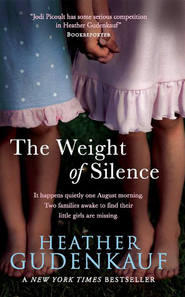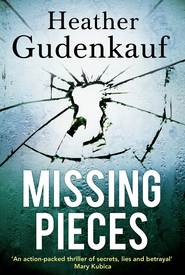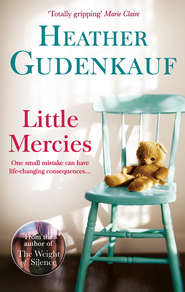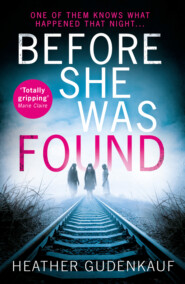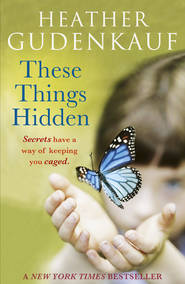По всем вопросам обращайтесь на: info@litportal.ru
(©) 2003-2025.
✖
Not A Sound
Автор
Год написания книги
2018
Настройки чтения
Размер шрифта
Высота строк
Поля
With long even strokes I pull the oar through the murky river. The newly risen sun, intermittently peeking through heavy, slow-moving gray clouds, reflects off droplets of water kicked up like sparks. The late-October morning air is bracing and smells of decaying leaves. I revel in the sights and feel of the river, but I can’t hear the slap of my oar against the water, can’t hear the cry of the seagulls overhead, can’t hear Stitch’s playful yips. I’m still trying to come to terms with this.
The temperature is forecast to dip just below freezing soon and when it does I will reluctantly stow my board in the storage shed, next to my kayak until spring. In front of me, like a nautical figurehead carved into the prow of a sailing vessel, sits Stitch. His bristled coat is the same color as the underside of a silver maple leaf in summer, giving him a distinguished air. He is three years old and fifty-five pounds of muscle and sinew but often gets distracted and forgets that he has a job to do.
Normally, when I go paddling, I travel an hour and a half north to where Five Mines abruptly opens into a gaping mouth at least a mile wide. There the riverside is suddenly lined with glass-sided hotels, fancy restaurants, church spires and a bread factory that fills the air with a scent that reminds me of my mother’s kitchen. Joggers and young mothers with strollers move leisurely along the impressive brick-lined river walk and the old train bridge that my brother and I played on as kids looms in the distance—out of place and damaged beyond repair. Kind of like me.
Once I catch sight of the train bridge or smell the yeasty scent of freshly baked bread I know it’s time to turn around. I much prefer the narrow, isolated inlets and sloughs south of Mathias, the river town I grew up in.
This morning there’s only time for a short trek. I have an interview with oncologist and hematologist Dr. Joseph Huntley, the director of the Five Mines Regional Cancer Center in Mathias at ten. Five Mines provides comprehensive health care and resources to cancer patients in the tristate area. Dr. Huntley is also on staff at Queen of Peace Hospital with my soon-to-be ex-husband, David. He is the head of obstetrics and gynecology at Q & P and isn’t thrilled that I might be working with his old friend. It was actually Dr. Huntley who called me to see if I was interested. The center is going to update their paper files to electronic files and need someone to enter data.
Dr. Huntley, whom I met on a few occasions years ago through David, must have heard that I’ve been actively searching for work with little luck. David, despite his grumblings, hasn’t sabotaged me. I’ll be lucky if he can muster together any kind words about me. It’s a long, complicated story filled with heartache and alcohol. Lots of alcohol. David could only take so much and one day I found myself all alone.
I come upon what is normally my favorite part of Five Mines, a constricted slice of river only about fifteen yards wide and at least twenty feet at its deepest. The western bank is a wall of craggy limestone topped by white pines and brawny chinquapin oaks whose branches extend out over the bluff in a rich bronze canopy of leaves. Today the river is unusually slow and sluggish as if it is thick with silt and mud. The air is too heavy, too still. On the other bank the lacy-leaf tendrils of black willows dangle in the water like limp fingers.
Stitch’s ears twitch. Something off in the distance has caught his attention. My board rocks slowly at first, a gentle undulation that quickly becomes jarring. Cold water splashes across my ankles and I nearly tumble into the river. Instead I fall to my knees, striking them sharply against my board. Somehow I manage to avoid tumbling in myself but lose my paddle and my dog to the river. Stitch doesn’t appear to mind the unexpected bath and is paddling his way to the shore. Upriver, some asshole in a motorboat must have revved his engine, causing the tumultuous wake.
I wait on hands and knees, my insides swaying with the river until the waves settle. My paddle bobs on the surface of the water just a few feet out of my reach. I cup one hand to use as an oar and guide my board until I can grab the paddle. Maybe it’s my nervousness about my upcoming interview, but I’m anxious to turn around and go back home. Something feels off, skewed. Stitch is oblivious. This is the spot where we usually take a break, giving me a chance to stretch my legs and giving Stitch a few minutes to play. I check my watch. It’s only seven thirty, plenty of time for Stitch to romp around in the water for a bit. Stitch with only his coarse, silver head visible makes a beeline for land. I resituate myself into a sitting position and lay the paddle across my lap. Above me, two turkey vultures circle in wide, wobbly loops. The clouds off in the distance are the color of bruised flesh.
Stitch emerges from the river and onto the muddy embankment and gives himself a vigorous shake, water dripping from his beard and moustache or what his trainer described as facial furnishings, common to Slovakian rough-haired pointers. He lopes off and begins to explore the shoreline by sniffing and snuffling around each tree trunk and fallen log. I close my eyes, tilt my face up toward the sky and the outside world completely disappears. I smell rain off in the distance. A rain that I know will wash away what’s left of fall. It’s Halloween and I hope that the storm will hold off until the trick-or-treaters have finished their begging.
Stitch has picked up a stick and, instead of settling down to chew on it like most dogs, he tosses it from his mouth into the air, watches it tumble into the water and then pounces. My stepdaughter, Nora, loves Stitch. I think if it weren’t for Stitch, Nora wouldn’t be quite as excited to spend time with me. Not that I can blame her. I really screwed up and I’m not the easiest person in the world to communicate with.
I’m debating whether or not to bring Stitch into the interview with me. Legally I have the right. I have all the paperwork and if Dr. Huntley can’t be accommodating, I’m not sure I want to work for him. Plus, Stitch is such a sweet, loving dog, I’m sure the cancer patients that come into the center would find his presence comforting.
My stomach twists at the thought of having to try and sell myself as a qualified, highly capable office worker in just a few short hours. There was a time not that long ago when I was a highly regarded, sought-after nurse. Not anymore.
Stitch has wandered over to where the earth juts out causing a crooked bend in the river, a spot that, lacking a better word, I call the elbow. I catch sight of Stitch facing away from me, frozen in place, right paw raised, tail extended, eyes staring intently at something. Probably a squirrel or chipmunk. He creeps forward two steps and I know that once the animal takes off so will Stitch. While nine times out of ten he’ll come back when I summon him, he’s been known to run and I don’t have time this morning to spend a half an hour searching for him.
I snap my fingers twice, our signal for Stitch to come. He ignores me. I row closer. “Stitch, ke mne!” I call. Come. His floppy ears twitch but still he remains fixated on whatever has caught his eye. Something has changed in his stance. His back is rounded until he’s almost crouching, his tail is tucked between his legs and his ears are flat against his head. He’s scared.
My first thought is he’s happened upon a skunk. My second thought is one of amusement given that, for the moment, our roles have reversed—I’m trying to gain his attention rather than the other way around. I snap my fingers again, hoping to break the spell. The last thing I need is to walk into my new job smelling like roadkill. Stitch doesn’t even glance my way.
I scoot off my board into knee-deep water, my neoprene shoes sinking into the mud. I wrestle my board far enough onto land so it won’t drift away. Maybe Stitch has cornered a snake. Not too many poisonous snakes around here. Brown spotted massasauga and black banded timber rattlers are rare but not unheard of. I pick my way upward through snarls of dead weeds and step over rotting logs until I’m just a few yards behind Stitch. He is perched atop a rocky incline that sits about five feet above the water. Slowly, so as to not startle Stitch or whatever has him mesmerized, I inch my way forward, craning my neck to get a better look.
Laying a hand on Stitch’s rough coat, damp from his swim, I feel him tremble beneath my fingers. I follow his gaze and find myself staring down to where a thick layer of fallen leaves carpets the surface of the water. A vibrant mosaic of yellow, red and brown. “There’s nothing there,” I tell him, running my hand over his ears and beneath his chin. His vocal chords vibrate in short, staccato bursts, alerting me to his whimpering.
I lean forward, my toes dangerously close to the muddy ridge. One misstep and I’ll tumble in.
It takes a moment for my brain to register what I’m seeing and I think someone has discarded an old mannequin into the river. Then I realize this is no figure molded from fiberglass or plastic. This is no Halloween prank. I see her exposed breast, pale white against a tapestry of fall colors. With my heart slamming into my chest, I stumble backward. Though I try to break the fall with my hands, I hit the ground hard, my head striking the muddy earth, my teeth gnashing together, leaving me momentarily stunned. I blink up at the sky, trying to get my bearings, and in slow motion, a great blue heron with a wingspan the length of a grown man glides over me, casting a brief shadow. Slowly, I sit up, dazed, and my hands go to my scalp. When I pull my fingers away they are bloody.
Dizzily, I stagger to my feet. I cannot pass out here, I tell myself. No one will know where to find me. Blood pools in my mouth from where I’ve bitten my tongue and I spit, trying to get rid of the coppery taste. I wipe my hands on my pants and gingerly touch the back of my head again. There’s a small bump but no open wound that I can feel. I look at my hands and see the source of the blood. The thin, delicate skin of my palms is shredded and embedded with small pebbles.
The forest feels like it is closing in all around me and I want to run, to get as far away from here as possible. But maybe I was mistaken. Maybe what I thought I saw was a trick of light, a play of shadows. I force myself back toward the ridge and try to summon the cool, clinical stance that I was known for when I was an emergency room nurse. I peer down, and staring up at me is the naked body of a woman floating just beneath the surface of the water. Though I can’t see any discernable injuries on her, I’m sure there is no way she happened to end up here by accident. I take in a pair of blue lips parted in surprise, an upturned nose, blank eyes wide-open; tendrils of blond hair tangled tightly into a snarl of half-submerged brambles keeps her from drifting away.
Pinpricks of light dance in front of my eyes and for a moment I’m blinded with shock, fear, dread. Then I do something I have never done, not even once at the sight of a dead body. I bend over and vomit. Great, violent heaves that leave my stomach hollow and my legs shaky. I wipe my mouth with the back of my hand. I know her. Knew her. The dead woman is Gwen Locke and at one time we were friends.
2 (#u69a603ba-3f92-530e-a628-d4b25c96beeb)
Gwen Locke. Nurses, the both of us. Friends at one time. Good friends. Once again my stomach clenches and I retch, but this time nothing comes up. Stitch’s trance has been broken and he paces in agitation, his powerful jaws opening and closing with what I’m sure are sharp yips and barks. I fumble with my FlipBelt, a tubular band with a series of pockets where I keep all the items that I have to carry with me when I’m on the river. Safely ensconced in a waterproof case is the cell phone that I promised my cop friend Jake I would carry with me at all times. Never mind that it would do me little or no good in emergency situations, like this one. Nine-one-one via text message hasn’t reached my silent little world yet so I dial the three numbers and hope for the best. I wait three seconds and begin to speak. “My name is Amelia Winn,” I say, I’m sure my voice is high and shrill and nasally. “I found a body. Please send help. I’m on Five Mines River, two miles north of Old Mine Road. I’m deaf and can’t hear you.”
Phone clutched between my fingers, I repeat the same message over and over before disconnecting. I found a body. Please send help. I’m on Five Mines River, two miles north of Old Mine Road. I’m deaf and can’t hear you.
Frantically, I turn around and around, my heart thrumming, the air squeezed from my chest. I try to swallow up each inch of the landscape with my eyes. The sway of switchgrass along the bank, each shiver of a tree branch, each shadowy crag and crevice in the bluffs could be concealing someone. Each whisper of a breeze across my neck, the killer’s touch. Nothing. No one there. The sun is slipping in and out from behind the clouds and every shift in light seems ominous. Finally, dizzy and exhausted, I sink to the ground and lean my back against the curly white bark of a paper birch. Though I’m afraid, I’m not fearful of someone noiselessly sneaking up on me. Stitch, snuggled up against me, his bearded chin resting on my lap, will alert me of any new presence. I just don’t know what I’m going to do if someone steps into the clearing to confront me. Do I run? Do I stay and fight? Would Stitch stay by my side to protect me? I don’t know.
Just when I think I have my breathing under control, the chills start in. Gwen lies only a few yards away from me. I pull the pepper spray that Jake gave me from another FlipBelt pocket.
Jake Schroeder is a Mathias police detective and best friend of my brother, Andrew, from when we were growing up. I’ve had a bit of a crush on Jake since I was eight. He thinks of me as a pesky little sister who still needs looking out for since my brother moved to Denver and my dad, fed up with Iowa winters, retired to Arizona.
Jake was the first one I saw when I opened my eyes in the hospital after a hit-and-run driver struck Stacey Barnes. Stacey was killed on impact and I suffered a broken leg, a severe head injury and the complete annihilation of the tiny bones and neural pathways of my inner ears. I was sure that the driver was the bastard who abused Stacey, but it wasn’t. So with no leads the case remains unsolved.
Two years later, I’m almost divorced, unemployed, profoundly deaf, probably an alcoholic and still a little pissed. Okay, an alcoholic. No probably. I still find it hard to admit. The only people in Mathias who haven’t given up on me are my stepdaughter, Nora, because she’s seven and I’m the only mother she remembers and Jake, who’s no stranger to heartache himself. Jake’s the one who hauled my drunk ass out of bed, got me to my first AA meeting, and made me take an American Sign Language (ASL) class at the local college with him. Even before my accident he was already proficient in ASL. Two counties over, a policeman shot and mistakenly killed a deaf teenager when he didn’t hear the command to stop. Local law enforcement, hoping to avoid future tragedies, arranged for training and Jake learned the basics. To top it all off he showed up at my house one day with a Czech dog trainer named Vilem Sarka and Stitch—a reluctant service dog.
Stitch came to me with his own baggage. A thick, zipper-like scar extends vertically from the bottom of his belly to just below his throat. Hence his name. “Some sick fuck. Over one hundred stitches,” Vilem wrote on a pad of paper when I asked what had happened.
I stroke Stitch’s head and wait for help, knowing that it could arrive in a matter of minutes or not for up to an hour. There are only three ways to get to our remote location: by boat, by four-wheeler or by foot. I focus my attention on Stitch’s ears; if they start to twitch I know he hears something. My bet is help will come via the river and a Department of Natural Resources officer with a boat. Up until now I have never been afraid around the dead and now I’m terrified.
I can’t believe Gwen is dead and I can’t help but think of my own accident, which I’m not convinced was an accident, after all. What if Gwen’s murder and my attempted murder are connected? Crazy, I know. But Gwen and I both treated patients who were abused by very bad, very dangerous people. Is it such a stretch to think they would come after the nurses who were trying to gather the forensic evidence to put them in jail for a very long time?
Stitch raises his head and looks at me with worry. I must have whimpered or spoken out loud. I do that sometimes without even knowing it. “It’s okay,” I tell him. My throat is sore and I figure I must have been shouting while I was talking to the 9-1-1 dispatcher. What if the person on the other end of the line couldn’t understand me? What if they don’t know where to send help and no one is coming?
I’m just about ready to call 9-1-1 again when Stitch scrambles to his feet and faces north and up the river. “Two if by sea,” I say, holding on to Stitch’s collar so he won’t run off.
Sure enough, a heavyset man of about sixty, steering a small boat with the Iowa DNR logo emblazoned across its side motors toward us. Stitch looks up at me for reassurance, and I gently pat his back. The boat slows and the DNR officer says something, but he’s too far away and I can’t read his lips.
“I can’t hear you,” I say, and the officer’s mouth widens in a way that tells me he’s shouting.
“No, I’m deaf,” I say, cupping my ear. “I can’t hear you. Come closer.” He looks at me suspiciously, hand on his sidearm. I can’t say that I blame him. I’m sure I sounded like a maniac on the 9-1-1 call. The dispatcher most likely added “approach subject with caution” when passing on the details.
“I can read lips,” I say. “I just need to see your face.”
He drives the boat up to the shore and with some difficulty climbs over the side and joins us beneath the birch. “Is he friendly?” the officer asks, glancing nervously down at Stitch.
“Very,” I assure him. I turn to Stitch and palm upward, bring my hand toward my shoulder. Immediately, he sits down. I reach into my pocket and pull out a dog treat and Stitch snags it with his long pink tongue. “Good boy.” That trick took three weeks to master.
The officer takes another cautious step forward. “I’m DNR Officer Wagner. Are you okay?” His lips stretch wide with each word. He’s overenunciating. I’m used to this when people first find out about my hearing loss.
“I’m fine,” I say with more confidence than I feel. “She’s over there.” I point to the maple tree. “Just over the ridge, in the water.”
“Stay here,” he orders. I pretend I don’t understand him and follow him up the incline, both of us grabbing onto low-hanging branches to avoid slipping on the slick decaying leaves that litter the ground. When we reach the crest my eyes immediately go to where Gwen’s body sways with the gentle current. Officer Wagner’s head swivels from left to right, searching. When his spine goes rigid I know he finally sees her. He gropes into his pocket and pulls out a cell phone and presses it to his ear.
I bend at the waist, again light-headed. I was an ER nurse for eighteen-odd years. I’ve seen people come in with injuries beyond comprehension. I’ve seen dead bodies before, have had people die from catastrophic injuries in my care. But always at the hospital, in a sterile, antiseptic setting.
I force myself to stand upright and take a deep breath. I feel useless. If there was a chance Gwen was still breathing I could have given her CPR, but it’s clear that she’s dead. Gwen is a bit younger than I am, and she’s fit—has the slim physique of a serious runner. Was she running or hiking the trails and then waylaid by a predator who dragged her off the path, raped and then killed her, finally tossing her into the river like trash?
From our vantage point, I can’t see any obvious injuries. No bullet holes, no gaping wounds, no scavengers have discovered her. She can’t have been in the river long. I think of the waves that knocked Stitch off my paddleboard and sent me to my knees just before I found Gwen’s body. I wish I saw what the boat looked like. I wish I had more information to offer the police. I wonder if her husband, Marty, has missed her yet. Or worse, could he have been the one to do this? I don’t know him well, but I met him several times. Gwen never mentioned having any problems in their marriage and he seemed like a nice man. And then there is their daughter, Lane. She will be devastated when she learns that her mother is never coming back home.
I swallow back my tears, pull my eyes from the body and scan the earth around me. Muddy footprints everywhere. I think I can discern three different shoe treads. Most likely my own and the DNR officer’s, and possibly the killer’s. There are also the imprints of Stitch’s large paws zigzagging the ground chronicling his agitation. Off in the brush is a discarded glass beer bottle. It could have belonged to one of the ever-growing number of weekend warriors who have discovered this length of river due to the opening of Five Mines Outfitters, located right next door to my house. The outfitter offers an array of outdoor services including canoe, kayak, paddleboard and in the winter, snowshoe and ice skate rentals.
Below us Stitch waits, wiggling impatiently while somehow remaining in a seated position. I gesture for him to settle and stay and he complies. Officer Wagner tugs on my sleeve and nods toward the woods below us. Emerging from the trees is a small troupe of four-wheelers. Unable to contain himself, Stitch leaps to his feet and begins to spin around in excitement.






